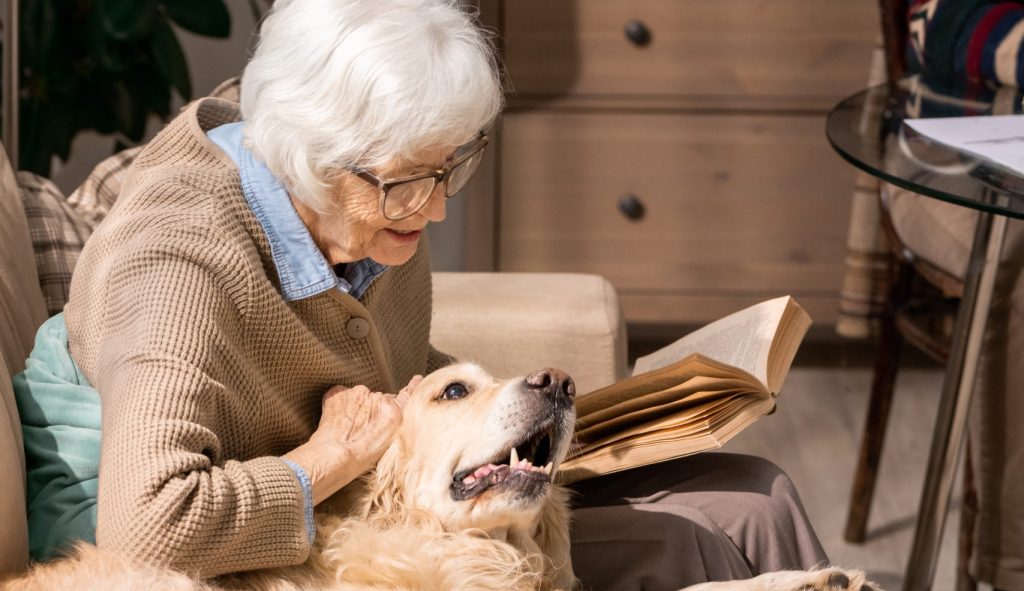Live-in dementia care at home means a dedicated carer moves into the home, providing round-the-clock support. Live-in dementia care offers continuity and reassurance, normally with one trusted carer supporting your loved one.
Our dementia care is designed for those who need support at home, whether for themselves or a family member:
We’re here to support you or your loved one with care that’s tailored, compassionate, and understanding. Our dementia live-in care service includes:
Choosing home care for dementia allows you or your loved one to:
Keep your loved one safe, supported, and cared for at home. Contact our team today to arrange personalised dementia care.
Call 0800 086 8686
Barbara, who lives with dementia, was struggling to cope alone. With the support of a Promedica24 live-in carer, her home is now safe, her health needs are met, and she can continue living happily with her beloved dog.
Read the full storyDementia is an umbrella term for conditions that affect memory, thinking, and behaviour. It develops over time and usually leads to increasing care needs. Home care for dementia helps maintain safety and comfort while supporting independence for as long as possible.
While there is no guaranteed way to prevent dementia, research suggests that certain lifestyle factors, such as staying active, eating a balanced diet, and avoiding smoking or excessive alcohol, may help lower the risk. An early diagnosis and appropriate support can also make a difference in managing symptoms and planning care.
Learn more about the early signs of dementia and what to look out forDementia describes a group of conditions, while Alzheimer’s is the most common type and accounts for about 60 – 80% of cases. Alzheimer’s typically starts with memory loss and gradually affects speech, reasoning, and mobility. Specialist Alzheimer’s care focuses on these challenges, helping individuals maintain dignity and wellbeing.
Other types of dementia include vascular dementia, Lewy body dementia and frontotemporal dementia.
Get practical advice for providing day-to-day Alzheimer’s care support at homeOne of the most recognised symptoms of dementia is memory loss that goes beyond normal forgetfulness. A person may not only forget someone’s name but might also stop recognising them as a friend or relative. They may lose track of where they live, what year it is, or want to return to a home from many years ago.
Dementia can also affect personality. Someone who was once calm or cheerful may become anxious, irritable, or unusually direct, which can feel very different from the person you know.
As the condition develops, people often rely more on others for reassurance. This might show up as repeated phone calls or questions, which are usually driven by memory loss or anxiety rather than choice.
Symptoms can vary, but they often follow stages:
Dementia is an umbrella term for various brain conditions that affect memory, thinking, behaviour and daily functioning. The exact symptoms and progression can vary depending on which parts of the brain are affected, so understanding the different types can help with planning and care.
In late-stage dementia, care becomes more complex. Families often worry this means a move to a nursing home, but with the right care and support, many people can remain at home even when their care needs change.
Our carers support with:
At Promedica24, our live-in Alzheimer’s and dementia care starts from £1,395 a week. The total cost of dementia care at home depends on:
Funding routes may include:
Yes. With the right support, people with dementia can safely remain in familiar surroundings. Live-in carers provide daily help, companionship, and reassurance.
A trained carer moves into the person’s home, supporting with personal care, meals, routines, and activities tailored to their needs.
Yes, in many cases. With round-the-clock support, people can often remain at home for as long as it’s safe and comfortable.
Simple, familiar activities (like listening to music, walking, puzzles, or looking at photos) can improve mood and wellbeing.
Care can often be arranged within days, depending on the individual’s needs and circumstances.
Visit our FAQ page for more information.


In her second blog for us, Beth Britton writes about how social interaction can help a person living with dementia… After a diagnosis of dementia, many people withdraw into themselves, sometimes because of the shock of the diagnosis, sometimes because of feelings of helplessness given that there are few treatments and no current cure, and […]
Read More

The ways in which changes to a person’s five basic senses – sight, hearing, smell, taste and touch – impact upon their dementia is something that our live-in carers see on a daily basis. Many people we support are living with some degree of sight and hearing loss, smells may have become distorted, taste impaired […]
Read More

In her latest blog for us, Beth Britton writes about depression and mental health and how to support a person who is depressed. Depression is one of the most common mental health conditions in the UK and worldwide. Indeed, depression was second only to high blood pressure in data looking at common health conditions […]
Read More